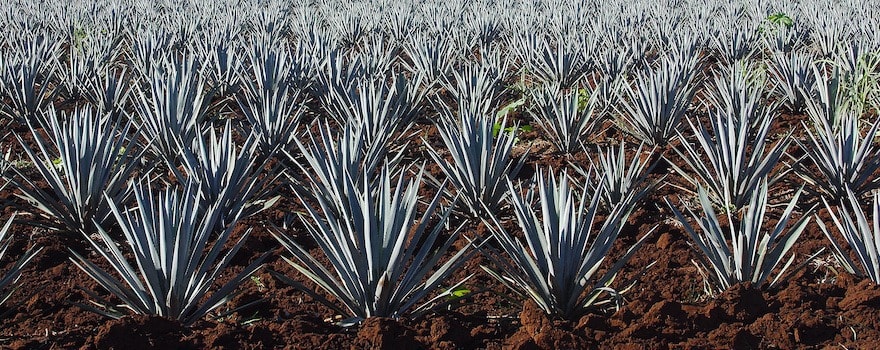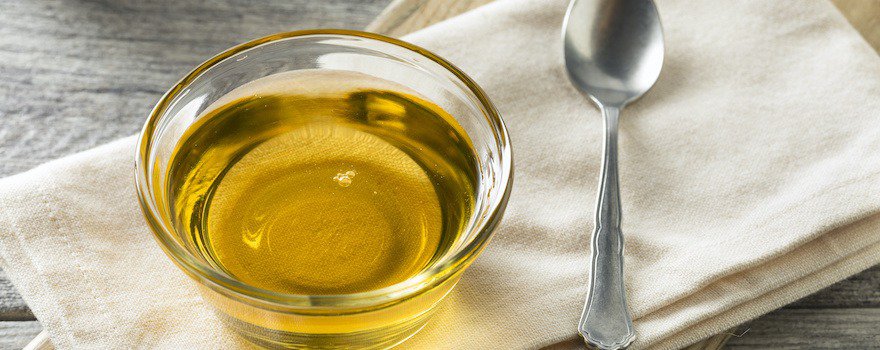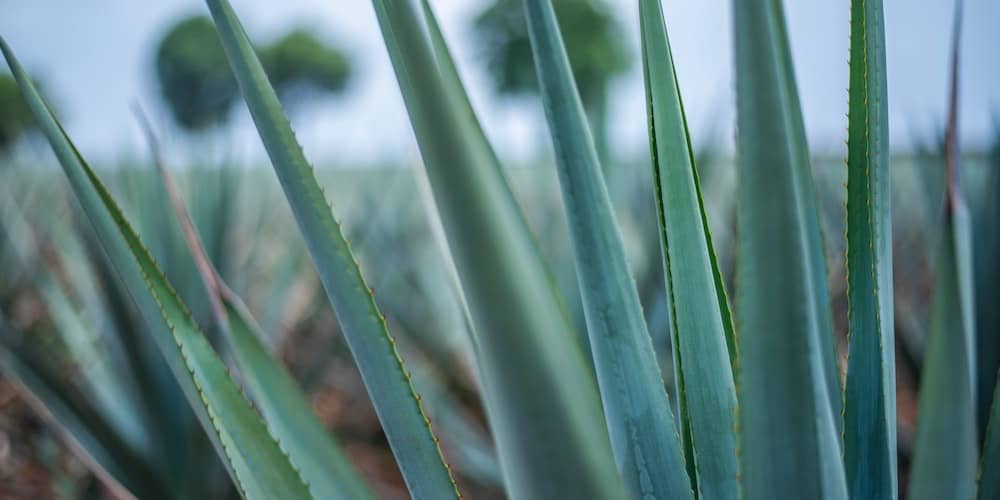BENEFITS OF AGAVE
✓ Fights bacteria
✓ Anti-inflammatory
✓ Helps with weight loss
✓ Supports the gut microbiota
✓ Helps control blood sugar
What is agave?
Agave is a succulent plant belonging to the Asparagaceae family. The genus includes many species, the best known of which are the American agave (Agave americana), the swan-neck agave (Agave attenuata) and the blue agave (Agave tequilana). All are native to the warm, dry regions of Central or South America: Mexico, Argentina, Chile… Some species also grow around the Mediterranean, such as in Corsica.
In Mexico, agave sap is mainly used for the production of alcoholic beverages such as tequila and pulque, a traditional drink of indigenous civilizations. The plant is deeply rooted in the country’s history and culture and still contributes to the country’s economy today.
Elsewhere, agave is mainly known and consumed in syrup form, extracted from the heart of the plant. Similar to honey, the syrup is appreciated for its mild flavor and high sweetening power.
That’s why it is a natural alternative to sugar like maple syrup, stevia, or lucuma.
But agave’s benefits don’t stop there, as it also has medicinal properties. It is antibacterial and anti-inflammatory, helps with weight loss, and supports the gut microbiota. The plant is also useful for controlling blood glucose.
In recent years, it has been the subject of extensive research because of its great versatility. Its uses are many and range from food to biofuels and textile fibers.
Producers are also looking to reuse harvest residues (biomass). Indeed, during production only the bulbs are used while the leaves and the bagasse (fibrous residue) are discarded. These could be converted into useful products for food, animal feed, agriculture, or textiles.
Nutritional composition
- Amino acids
- Vitamins : provitamin A, B1, B2, B3, B5, B6, B11, C, E, K
- Minerals and trace elements : iron, calcium, phosphorus, magnesium, potassium, sodium, zinc
- Carbohydrates
- Proteins
- Fiber
- Sugars : sucrose, glucose, fructose
- Water

The benefits of agave
🦠 Fights bacteria
Agave fights certain bacteria that are harmful to the body. This action is believed to be due to the fructans it contains. These are complex chains of fructose that are also found in some grasses such as wheat, oats, and spelt.
These fructans have shown a powerful antibacterial action against the Salmonella by reducing their growth. They also inhibit the development of the pathogenic bacteria Escherichia coli, Listeria, and Shigella.
This study from the University of Guanajuato (Mexico), conducted directly in the laboratory, demonstrates the antibacterial activity of agave fructans.
🔥 Anti-inflammatory
Agave contains various compounds such as sapogenins, palmitoyl, and glucopyranosyl sitosterol. Behind these names are natural substances capable of reducing inflammation.
These compounds lower the levels of interleukins 1 and 6 involved in the body’s inflammatory response. At the same time, they block the action of tumor necrosis factor (TNF) and increase levels of interleukins 4 and 10 that help reduce inflammation.
This study of the Mexican Social Security Institute (Mexico), conducted on mice, shows the anti-inflammatory effect of agave.
🏃🏻♂️ Helps with weight loss
Several studies have shown that consuming agave can help with weight loss. Among the various fructans it contains is inulin, a type of soluble fiber that increases satiety and promotes reductions in BMI and body fat.
Inulin thus helps regulate appetite as part of a diet and to limit snacking throughout the day. In cooking, it can be used to replace part of the sugar and fats for lighter meals.
This study from the Research and Assistance Center for Technology and Design of the State of Jalisco (Mexico), conducted in obese patients, shows how agave helps with weight loss.
♻️ Supports the gut microbiota
Agave fructans have a beneficial effect on the gut microbiota. Inulin, for example, exerts a prebiotic effect, meaning that it feeds the microbiota and promotes the development of good bacteria. It notably stimulates the growth of bifidobacteria and lactobacilli.
Like chia seeds or carob, this plant can improve intestinal health and prevent the development of diseases such as colitis and colon cancer.
This study from the National Autonomous University of Mexico, conducted on rodents, shows the prebiotic effect of agave inulin.
🍭 Helps control blood sugar
Agave syrup is distinguished by its low glycemic index, which is only 15. It thus limits blood sugar spikes after meals. It is an interesting alternative for people with diabetes to better control their blood glucose and reduce their consumption of refined sugar.
This study from San Diego State University (United States), conducted on mice, shows how agave syrup helps control blood sugar.

Agave syrup
Agave syrup is also called agave nectar or aguamiel. It is extracted from the ‘piña’, the bulb that resembles a pineapple located at the heart of the plant and which can weigh up to 50 kilograms! Once the sap is filtered and heated, you obtain a liquid with a beautiful amber color and a texture more fluid than honey.
Made of fructose, it has good sweetening power. Thus, 75 g of agave syrup could replace 100 g of sugar. It can be used in all cooking recipes and beverages : cakes, cookies, yogurts, fresh cheeses, smoothies, tagines… Its taste is rather mild and neutral. It also constitutes a plant-based alternative to honey for vegans.
Check the labels: the product must contain 100% agave syrup.

Sustainable consumption: favor organic, fair-trade agave
The plant is mainly grown in Mexico, notably in the state of Jalisco, along the Pacific Ocean. A large part of the production is used to produce tequila, the famous Mexican beverage. The other part is intended for the production of agave syrup which is then exported around the world.
Unfortunately, industrial syrups often contain added sugar and additives. If you can, choose agave syrup certified organic and unrefined.
Also check the manufacturing process used. Indeed, the syrup is often heated to very high temperatures, thus losing all its nutrients. Prefer agave syrup from fair trade sources because it is made by local producers in a traditional way.

Dosage
Keep in mind that even if agave syrup is “better” than white sugar, it is still sugar and should therefore be consumed in moderation. The recommended dosage is less than 30 g per day (one large tablespoon).
Contraindications and side effects
Agave consumption presents certain contraindications :
- Because of its high sugar content, people who are overweight should consume it in moderation ;
- People with diabetes should consult their doctor before consuming it.
Excessive consumption presents certain side effects :
- Digestive disorders
- Abdominal pain
- Diarrhea
- Allergic reaction
If you experience side effects, stop consuming it and consult a doctor.
Sources and scientific studies
Naivy Y Nava-Cruz, Miguel A Medina-Morales, José L Martinez, R Rodriguez, Cristóbal N Aguilar, 2014. Agave biotechnology: an overview.
Erika Alejandra Martínez-Ortega, José Sergio López-Briones, Gabriela Rodríguez-Hernández, Ricardo Ernesto Ramírez-Orozco, Elena Franco-Robles, 2020. Antibacterial activity of agave fructans against salmonella typhimurium.
Elizabeth Hernández-Valle, Maribel Herrera-Ruiz, Gabriela Rosas Salgado, Alejandro Zamilpa, Martha Lucia Arenas Ocampo, Antonio Jiménez Aparicio, Jaime Tortoriello, Enrique Jiménez-Ferrer, 2014. Anti-inflammatory effect of 3-O-[(6′-O-palmitoyl)-β-D-glucopyranosyl sitosterol] from Agave angustifolia on ear edema in mice.
Eduardo Padilla-Camberos, Carla P Barragán-Álvarez, Nestor E Diaz-Martinez, Vineet Rathod, José Miguel Flores-Fernández, 2018. Effects of Agave fructans on Body Fat and Serum Lipids in Obesity.
Marisol Rivera-Huerta, Vania Lorena Lizárraga-Grimes, Ibrahim Guillermo Castro-Torres, Mabel Tinoco-Méndez, Lucía Macías-Rosales, Francisco Sánchez-Bartéz, Graciela Guadalupe Tapia-Pérez, Laura Romero-Romero, María Isabel Gracia-Mora, 2017. Functional Effects of Prebiotic Fructans in Colon Cancer and Calcium Metabolism in Animal Models.
Shirin Hooshmand, Brittany Holloway, Tricia Nemoseck, Sarah Cole, Yumi Petrisko, Mee Young Hong, Mark Kern, 2014. Effects of agave nectar versus sucrose on weight gain, adiposity, blood glucose, insulin, and lipid responses in mice



